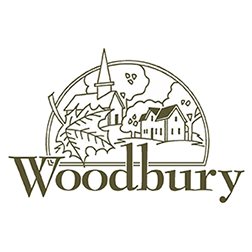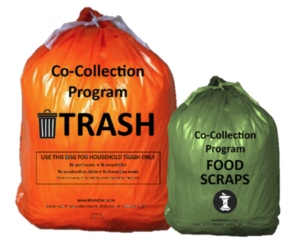
Town of Woodbury, CT
Frequently Asked Questions

Transfer Station permit holders will be provided with free bags to use during the yearlong pilot period. This is enough for two 15-gallon orange trash bags and one 8-gallon green food scraps bag per week. At home, residents will separate food scraps from their trash and place in the green bags. Non-recyclable trash will go in the orange bags. When residents come to the Transfer Station, there will be two separate containers, one to dispose of Orange trash bags and one for Green food scraps bags. The food scraps will be converted to green energy at an industrial composter.
Transfer Station permit holders will be able to pick up your free bags at the Transfer Station, during open hours (8am-4pm) on
January 31, February 2, 3, 4 or
February 7, 9, 10, and 11.
Each Transfer Station permit holder will receive enough bags for 2 orange trash bags (15-gallons each) and 1 green food scrap bag (8-gallons each) for each week of the pilot.
If you are unable to make it to the Transfer Station during these two weeks, please contact Woodbury Public Works using the information at the bottom of the page.
Residents are encouraged to be sure to recycle all they can and separate their food scraps to stay with in the allotted trash bags. Additional trash and food scrap bags will be available at local retailers. List to be provided at a later date.
There are no changes to the recycling program. Please continue to place your bottles & cans, paper & cardboard in your recycling bin. Items should be clean and dry and placed loose in your bin. Questions about recycling? Learn more about recycling here.
The pilot program is free for Transfer Station permit holders – you will be provided with an allotment of orange trash and green food scraps bags to use during the pilot. Residents are encouraged to use the provided orange trash bags and we ask each resident to separate out food scraps as best they can and place them in the green bags. With rising disposal costs, it is important to separate out food scraps and recyclables from disposal. Learn more here.
The green food scrap bags will be sent to Quantum Biopower in Southington, CT. Quantum is an anaerobic digestion facility that turns food scraps into clean, renewable energy and compost, saving it from the trash can.
No. Remember, food scrap collection is not adding new odors to your waste stream. It is simply separating food from trash. Food scraps in separate green bags produce no more odor than when it’s not separated from the trash. Keeping a tight lid on your indoor kitchen food scrap collection bucket will keep odors out. Rinsing kitchen buckets as needed and taking food scrap bags to the Transfer Station weekly (even if they are not full) should keep odors to a minimum. In the summer, you may choose to keep food scraps in the freezer in a separate container until just before collection.
Here are some additional tips:
Seal it. Keep the lid tightly closed at all times to prevent odors and nuisance pests like fruit flies.
Cool it. Store your bin out of direct sunlight if you can, as heat can speed up smells.
Cover it. You can also add in any newsprint, soiled paper towels, or napkins to your food scrap bag, as that might assist with any odors. Stale bread can also help here.
Freeze it. If you are finding that even with the lid the smell is off-putting, consider keeping a small container (such as a small bag or Tupperware-type bowl) in your fridge/freezer to collect the scraps before you transfer to the green bag and bring to the Transfer Station. Nothing can stink when it is frozen! If you can’t fit all of your food waste inside the freezer, consider freezing meat and dairy scraps as they are often the smelliest.
Sprinkle it. If your kitchen pail smells, sprinkle a bit of baking soda inside to neutralize the smell.
Drain liquids before putting food scraps in your kitchen bin.
Include soiled paper towels and napkins to help absorb liquids.
Keep food scraps in freezer.
Wrap meat, poultry, and fish in newspaper.
To get rid of summertime fruit flies, set a trap. Place a small bottle of cider vinegar, with a few drops of dish soap added to it, near your kitchen bin.
Bring your green food scraps bag to the Transfer Station every week, even if it is not full.
No, it won’t. With separate food scraps collection you are just moving food scraps into a different bag.
Backyard composting is great and encouraged! You may decide you want to use the green bags for certain items (eggshells, meat, bones, and dairy, prepared foods) or to use in the winter.
To reduce the high cost of nitrogen processing at the wastewater treatment facility, we strongly urge residents to switch from in-sink disposals and use the green bags for food scraps. It will also save on your water usage and produce usable fertilizer.
Reduce your food waste. Keep your refrigerator clean and organized so you know what you have before you shop. Store leftovers in clear containers so you can see what’s in them. Use a shopping list. Use your freezer. Reduce other household waste by avoiding single use disposable items and choose products with minimal packaging.
Reuse: Use reusable shopping bags and coffee mugs. Repurpose glass jars at home. Donate household items and clothing. Consider cloth napkins.
Recycle: Remember the basics: Recycle your paper & cardboard and empty bottles & cans. Items should be clean and dry and placed loose in your collection bin. Also, try the What’s In What’s Out tool at www.recyclect.com Type in the product you are wondering about and the tool will tell you if its recyclable.
Compost: Place all your food scraps in the green bags! Fruits & Veggies, Eggs & Eggshells, Meat & Seafood (include bones and shells), Coffee Grounds & Tea Bags, Dairy, Pasta, Grains & Bread, Cookies, Cake, & Candy. You can also include food-soiled paper, such as napkins and paper towels. Please no plastic, no metal, no sanitary waste, no pet waste.
Become a community champion! We are looking for residents to step up and share their experiences with the pilot program with the rest of the community. This could involve helping to plan/host/attend an event that will educate the public on the waste crisis and tips to reduce waste.
Raise your voice: Write an op-ed! Contact your local leader! Make a post on social media about your experience with the program! We want to hear your questions, concerns, or ideas to make the program better and more accessible.
More Information
For more information, please contact the Naugatuck Valley Council of Governments (NVCOG)
Contact
Christine O’Neill, NVCOG
49 Leavenworth Street,
Waterbury, CT 06702
(203) 489-0351
Transfer Station
22 Bacon Pond Rd
Woodbury, CT 06798
(203) 263-3633
Hours
Tuesday 8:00AM – 3:30PM
Thursday 8:00AM – 3:30PM
Friday 8:00AM – 3:30PM
Saturday 8:00AM – 3:30PM